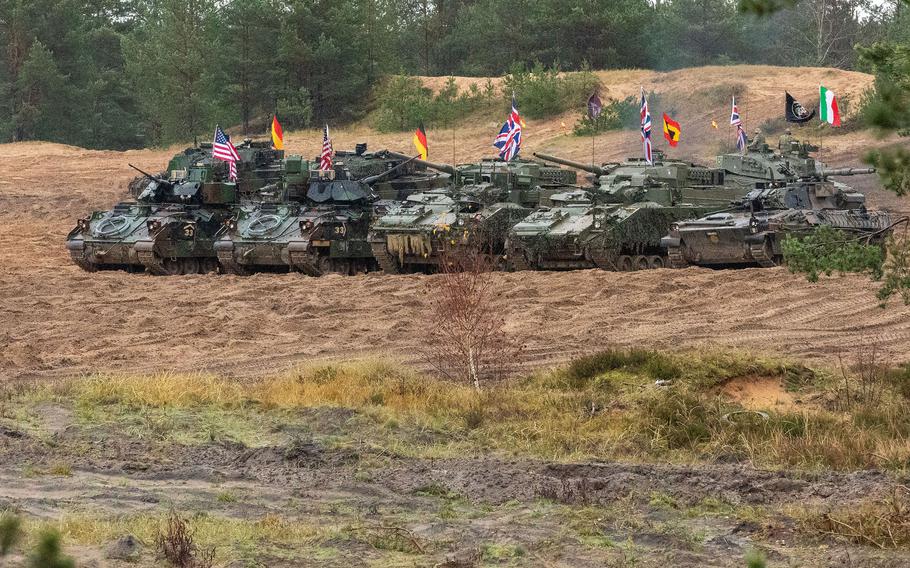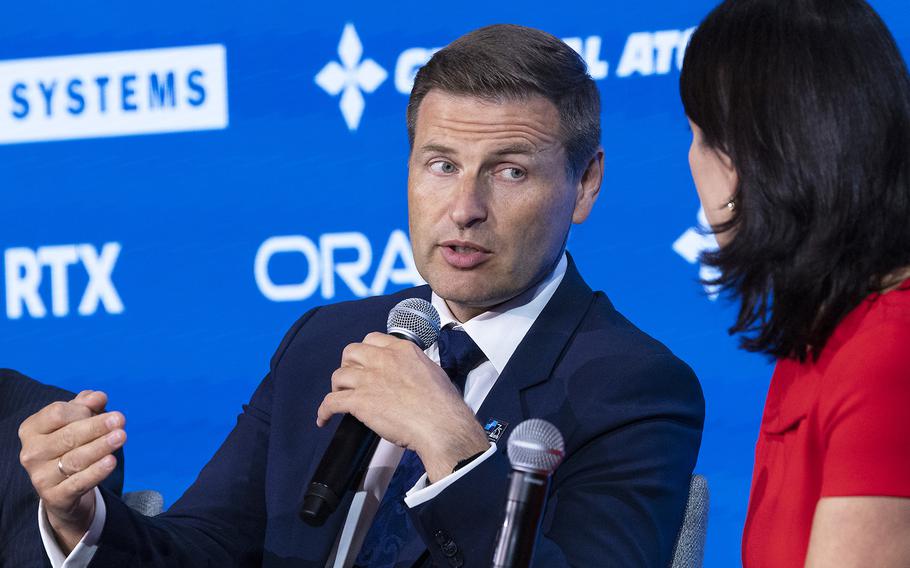
Troops from Germany, Italy, the Netherlands, the U.K. and the U.S., assigned to NATOs enhanced Forward Presence Battle Group Poland, stage their vehicles before a firepower demonstration in Adazi, Latvia, Nov. 13, 2023. (H Howey/U.S. Army)
Top defense chiefs from the Baltic states said Tuesday that NATO allies need to increase military spending levels beyond the alliance’s longstanding 2% of each country’s gross domestic product, arguing huge capability gaps demand a larger investment from all member states.
Their comments, made on the sidelines of NATO’s three-day Washington summit now underway, could be a point of contention between Eastern European members and others inside the security pact who are still struggling to reach lower alliance targets.
“Our voice here is very clear, 2% is not enough. … We have a huge shortage in capability,” Estonian Defense Minister Hanno Pevkur said, speaking at an event hosted by Politico.
Along with the United States and Poland, the Baltic states are top military spenders in NATO based on GDP percentages.

Estonian Defense Minister Hanno Pevkur answers a question from moderator Luiza Savage of Politico during a defense forum Tuesday, July 9, 2024, at the U.S. Chamber of Commerce in Washington. (Joe Gromelski/Special to Stars and Stripes)
In Washington, the push this week to boost defense spending will be high on the agenda along with how to deliver more support to Ukraine in its war against Russia. But political dynamics and the upcoming U.S. presidential election are also factoring into discussions.
With former President Donald Trump leading in the polls after President Joe Biden’s debate performance two weeks ago, the implications of a potential Trump return have allies talking.
While Biden has long been viewed as a NATO booster, dating to his many decades in the Senate, Trump took a more transactional approach to relations with allies that upended old diplomatic norms.
The prospect of a second Trump term has caused a panic among some security analysts fearful that he will seek to pull the United States out of NATO, which is marking its 75th anniversary.
Trump, who spent much of his tenure questioning the worth of NATO and has expressed unwillingness to help defend some allies should they come under attack, also has spoken of reducing the number of U.S. forces in Europe.
The three countries that make up the Baltics are on the front line and most exposed to potential Russian aggression. In those nations, American troops are seen as the centerpiece of the NATO’s security architecture. Yet defense ministers from Estonia, Lithuania and Latvia each expressed confidence that if Trump is reelected, NATO will remain secure.
“The United States is indispensable for us,” said Andris Spruds, the Latvian defense minister. “But we believe NATO is also indispensable for the United States.”
Spruds credited Trump for making an issue of insufficient European defense spending.
“Trump was right on raising the voice [on] 2%,” he said.
In 2014, allies agreed all alliance members should hit the 2% mark by 2024. At the time, only three allies hit that target. NATO Secretary-General Jens Stoltenberg said Friday that 23 of NATO’s 32 members are on pace to reach the 2% threshold this year, including Germany, which has faced intense criticism over the years for not investing enough money in its defense. Still, Stoltenberg has said 2% should be regarded as the bare minimum, and member states should strive to spend more.
Spruds also noted during Trump’s tenure, the number of U.S. troops in Europe increased, including in his country, despite his anti-NATO rhetoric.
“Look at deeds rather than words,” he said.
Lithuanian Defense Minister Laurynas Kasciunas echoed that outlook.
“The U.S. presence in Europe is crucial to us,” he said. “We don’t see a safe and secure Europe without the U.S presence.”
Kasciunas said Trump is businessman and a dealmaker by nature.
“Sit down and find a deal,” he said.